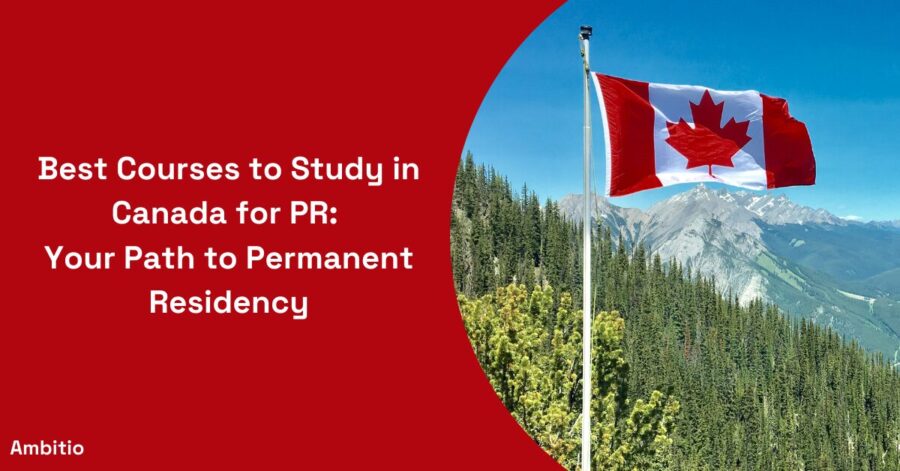13 December 2024
6 minutes read
Best Courses to Study in Canada for PR: Your Path to Permanent Residency

Canada, known for its breathtaking landscapes, diverse culture, and high-quality education system, is also one of the top destinations for international students aspiring to become permanent residents.
If you’re considering studying in Canada and want to secure permanent residency, you’ve come to the right place. In this comprehensive guide, we’ll delve deeper into the best courses to study in Canada for PR, offering you valuable insights into the education system, the PR process, and much more.
The Canadian Advantage
Canada’s allure as a study destination lies not only in its natural beauty but also in its welcoming attitude towards international students. The country values diversity and actively encourages students from around the world to pursue their education here. Moreover, Canada boasts some of the world’s top-ranked universities and colleges, making it an educational powerhouse.
But what truly sets Canada apart is the immigration policies that make it relatively easier for international students to transition to permanent residency. By choosing the right course of study, you can align your education with your long-term goal of becoming a Canadian permanent resident.
Choosing the Right Course
Selecting the right course is the first crucial step towards your journey to permanent residency in Canada. Let’s explore some popular options that not only provide quality education but also increase your chances of obtaining PR.
1. Business Management Courses (H3)
Canada’s robust economy welcomes professionals with business acumen. Pursuing a degree in business management, such as an MBA, can open doors to PR. These programs often include internships and co-op opportunities that allow you to gain valuable Canadian work experience, a crucial factor in the PR process.
2. Computer Science and IT Courses (H3)
In today’s digital age, IT professionals are in high demand worldwide. Canada is no exception, and studying computer science or related IT courses can significantly boost your PR prospects. The technology sector is booming, and skilled professionals are always in demand.
3. Healthcare and Nursing Programs (H3)
Canada’s healthcare system consistently seeks skilled professionals to cater to its diverse population. Pursuing nursing or healthcare-related courses can be a gateway to PR. These programs often offer opportunities for internships and work placements in healthcare facilities across Canada.
4. Engineering Degrees (H3)
Engineers play a vital role in Canada’s infrastructure development and innovation. Engineering programs offer excellent career prospects, especially when they align with your long-term career goals. Choose from various engineering disciplines, such as civil, mechanical, or electrical engineering.
5. Short-Term Courses (H3)
Not all PR pathways require long-term commitment. Some short-term courses, especially those in high-demand areas like project management, digital marketing, or data analytics, can lead to PR. These courses provide a quick route to gaining valuable Canadian work experience.
It’s essential to note that each course may have specific eligibility criteria for PR. Be sure to research thoroughly and select a program that aligns with your career goals and interests.
Understanding the PR Process
Gaining permanent residency in Canada typically involves a multi-step process. Let’s break it down to understand each step better:
1. Study in Canada (H3)
The journey begins with your decision to study in Canada. Enroll in a Canadian educational institution and complete your chosen program. Make the most of your academic experience by engaging in extracurricular activities and networking.
2. Obtain Post-Graduation Work Permit (PGWP) (H3)
After successfully graduating, the next step is to apply for a Post-Graduation Work Permit (PGWP). This permit allows you to work in Canada temporarily and gain valuable work experience in your field.
3. Gain Canadian Work Experience (H3)
Working in Canada is not only a source of income but also a means to earn points for your PR application. The Canadian Experience Class (CEC) program considers your Canadian work experience when assessing your PR eligibility.
4. Express Entry or Provincial Nominee Program (PNP) (H3)
To apply for PR, you’ll typically choose between two main pathways: Express Entry and Provincial Nominee Program (PNP). Express Entry is a points-based system that considers factors like age, education, work experience, and language proficiency. On the other hand, PNP allows individual provinces and territories to nominate candidates based on their specific labor market needs.
5. Invitation to Apply (ITA) (H3)
If your profile meets the criteria and you have a competitive score, you may receive an Invitation to Apply (ITA) for PR. This invitation is a significant milestone in your journey.
6. PR Application (H3)
Once you receive an ITA, you’ll need to submit your PR application. Ensure you gather all the required documents and pay the necessary fees. The processing time for PR applications can vary, so it’s crucial to stay patient during this stage.
7. Wait for Approval (H3)
Waiting for your PR application to be processed can be a bit nerve-wracking, but it’s an essential part of the process. The processing time may take several months, depending on various factors.
8. Permanent Residency (H3)
Once your PR application is approved, you will become a Canadian permanent resident. This status grants you the right to live, work, and study anywhere in Canada. It’s a significant achievement that opens doors to countless opportunities.
Cost of Living in Canada
When considering studying in Canada and pursuing permanent residency, it’s essential to understand the cost of living in this vast and diverse country. Canada offers an excellent quality of life, but it’s crucial to budget wisely to make the most of your experience. Let’s break down the key aspects of the cost of living in Canada.
Tuition Fees
The cost of education in Canada varies depending on the institution, program, and location. Generally, international students can expect to pay higher tuition fees than Canadian residents. Tuition fees can range from CAD 10,000 to CAD 35,000 or more per year, depending on the level of study and the university or college you choose.
It’s advisable to research institutions and their tuition fees thoroughly. Scholarships, grants, and financial aid are available to help offset the costs for international students.
Accommodation Costs
Accommodation is a significant expense, and it varies depending on where you choose to live. Here are some common housing options and their approximate costs:
- On-Campus Housing: If you opt for on-campus housing, you can expect to pay between CAD 8,000 and CAD 15,000 per academic year. Prices may vary based on room type and location.
- Off-Campus Housing: Renting an apartment or shared accommodation off-campus can range from CAD 600 to CAD 2,500 per month, depending on the city and location.
- Homestays: Living with a Canadian host family can cost around CAD 800 to CAD 1,500 per month, including meals and utilities.
- Utilities: Monthly utility bills, including electricity, heating, cooling, and water, can add up to approximately CAD 150 to CAD 200 per month.
- Internet and Mobile: Internet and mobile phone plans can cost around CAD 60 to CAD 100 per month.
It’s essential to budget for housing expenses based on your chosen city and lifestyle preferences.
Food and Groceries
The cost of food in Canada can vary depending on your dietary choices and where you shop. On average, a student can expect to spend around CAD 250 to CAD 350 per month on groceries. Eating out at restaurants or fast-food establishments may cost around CAD 10 to CAD 30 for a meal.
Transportation Costs
Transportation costs in Canada can also fluctuate depending on the city and your mode of transport. Some common expenses include:
- Public Transit: Monthly transit passes can range from CAD 80 to CAD 130, depending on the city. Larger cities like Toronto and Vancouver may have higher transit costs.
- Car Ownership: If you own a car, consider expenses such as fuel, insurance, maintenance, and parking, which can add up to several hundred dollars per month.
- Bicycles and Walking: Some students opt for eco-friendly transportation options, such as cycling or walking, to save on costs.
Health Insurance
Health insurance is essential while studying in Canada. Most provinces require international students to have private health insurance until they become eligible for the provincial health care plan. The cost of health insurance can vary but generally ranges from CAD 600 to CAD 1,000 per year.
Miscellaneous Expenses
It’s crucial to budget for miscellaneous expenses, which may include textbooks, school supplies, clothing, and entertainment. On average, students may spend approximately CAD 100 to CAD 200 per month on these miscellaneous items.
Budgeting Tips
To manage your cost of living effectively in Canada, consider the following tips:
- Create a Budget: Develop a monthly budget that outlines your income and expenses. Stick to it as closely as possible to avoid overspending.
- Cook at Home: Preparing meals at home is usually more cost-effective than eating out regularly. You can also take advantage of student discounts offered by some grocery stores.
- Use Student Discounts: Many businesses offer discounts to students, so don’t forget to inquire about these opportunities.
- Opt for Public Transit: If you live in a city with good public transportation, consider using it instead of owning a car, which can save you significant money.
- Seek Scholarships and Part-Time Work: Look for scholarships and part-time job opportunities to supplement your income.
- Plan for Emergencies: Set aside some money for unexpected expenses, such as medical emergencies or car repairs.
Conclusion
Choosing the best course to study in Canada for PR is a significant decision that can shape your future. Consider your career goals, eligibility criteria, and the demand for your chosen field in Canada.
With dedication and the right course, you can achieve your dream of becoming a Canadian permanent resident and enjoy all that this vibrant country has to offer. In summary, Canada not only offers a world-class education but also a clear pathway to permanent residency for international students.
By choosing one of the recommended courses and following the PR process diligently, you can embark on a successful journey toward building your future in Canada. Embrace the opportunities, and Canada may soon become your new home.
FAQs
What are PR-friendly courses in Canada?
PR-friendly courses are those that have a higher likelihood of leading to permanent residency due to their demand in the Canadian job market. These include programs in healthcare, technology, and engineering.
Can international students get PR in Canada?
Yes, international students in Canada can apply for PR. Completing a study program in Canada is often a significant step towards this goal.
How long do you need to live in Canada to apply for PR?
Generally, you need to live in Canada for at least 12 months within the past three years to be eligible for PR.
What are the top 5 Canada visa categories for professionals?
The top 5 Canada visa categories for professionals include Express Entry, Provincial Nominee Program (PNP), Quebec Skilled Worker Program, Atlantic Immigration Pilot Program, and Canadian Experience Class.
Do all courses in Canada lead to PR?
No, not all courses in Canada lead to PR. To increase your chances, choose programs in high-demand fields and ensure they align with Canada’s immigration requirements.

You can study at top universities worldwide!
Get expert tips and tricks to get into top universities with a free expert session.
Book Your Free 30-Minute Session Now! Book a call now




























